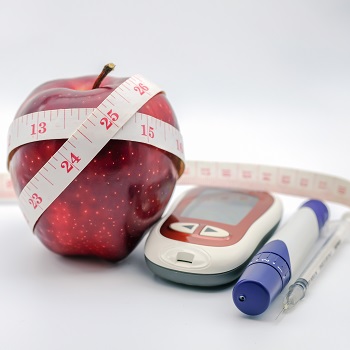Diabetes rates have skyrocketed in the United States in the last two decades. At least twice as many Americans have diabetes today as did in the late 1990s when the Centers for Disease Control and Prevention first started tracking cases of diabetes in the U.S.
The increase in diabetes is largely due to the corresponding increase of Americans who are also overweight or obese. We know that obesity is a risk factor for diabetes, but the diabetes and weight connection is more complicated than you might think.
Excess body weight triggers an increase in insulin production, eventually leading to insulin resistance and development of diabetes. And while controlling the disease is all about managing blood sugar, which can be achieved by losing weight, the connection between blood sugar and weight loss can be a vicious cycle.
How does blood sugar affect weight loss?
Every time you eat, your pancreas produces a hormone called insulin, which helps your body distribute sugar (also known as glucose) among the cells, where it is used for energy. Weight gain, especially around the midsection, can lead to insulin resistance, which means cells in the body no longer respond to insulin.
Cells that are resistant to insulin are unable to utilize glucose from the blood, so blood sugar levels can build up, causing blood sugar spikes that can be severely damaging to your body over time. High blood sugar levels signal to the pancreas that more insulin is needed. The more insulin your body produces, the easier it is for you to gain weight, as the hormone also causes the body to store extra sugar as fat.
For many people who have type 2 diabetes, losing weight can slow down and even reverse the disease. Unfortunately, due to the vicious blood sugar/weight gain cycle, losing weight becomes increasingly difficult as your body becomes more resistant to insulin.
But don’t lose hope. If you have high blood sugar levels or have been diagnosed with diabetes, weight loss isn’t impossible if you understand the connections between blood sugar, body fat and insulin, and what to do about it. Here are some tips to help you shed unwanted pounds, lowering your blood sugar and slowing down the progression of diabetes.
Eat more frequently. To avoid blood sugar spikes and dips, it’s important to eat more often throughout the day. This doesn’t mean you should consume more calories, but to simply eat more healthy, small meals and snacks during the day. Eating smaller portions reduces overall caloric intake and can help keep your blood sugar steady.
Eat a balanced diet. Don’t just think about cutting calories. The body needs calories from carbs and healthy fats to sustain energy. Rather than reducing calories, you should maintain a healthy balance of complex carbohydrates, protein and fiber. A registered nutritionist can provide a more specific plan for weight loss diet that is tailored to your specific needs.
Exercise regularly. Physical activity helps your body utilize glucose more efficiently, without the need for more insulin. Over time, exercise can even improve insulin sensitivity. Aim for 150 to 175 minutes of moderately intense exercise every week, but break it up into 10 or 15 minute increments. Be sure to include strength training in your exercise routine. Muscle mass declines with age, so strength training is essential even to just maintain what muscle mass you already have. And keep in mind that muscle burns more calories, even when your body is at rest. If you’re new to exercise, be sure to talk to your doctor before you begin an exercise regimen.
Find stress relief. Stress reduces insulin production and triggers the release of glucose in the body to use as energy in the fight-or-flight response. But that extra fuel isn’t doing you any favors if it’s not being burned off through physical exertion. Find healthy ways to cope with stress, such as exercise, yoga, meditation or tai chi.
Consider weight loss surgery. If you are significantly overweight or obese and have diabetes, bariatric surgery can be an effective treatment for your disease and reduce your dependency on diabetes medication. Even if you haven’t already been diagnosed with the disease, any weight loss can help reduce your risk. The American Diabetes Association endorses weight loss surgery as a viable treatment for diabetes, even in patients who are mildly obese, as the procedure alters how the body handles insulin and blood sugar.
It may be a challenge, but it is not impossible to interrupt the cycle of rising blood sugar and weight gain. If you have diabetes or a family history of the disease, schedule an appointment with a First Baptist Medical Center weight loss doctor to learn more about how medical interventions can help improve your health and reduce your risk of diabetes. An experienced weight loss doctor can make recommendations for surgical or non-surgical interventions which may help keep your blood sugar balanced and encourage weight loss.






